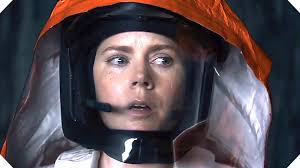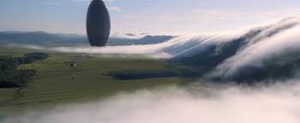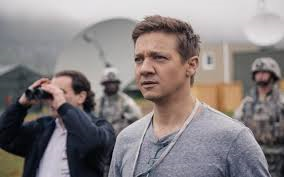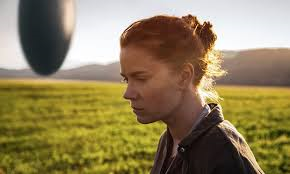Movie Review: Arrival

Canadian director Denis Villeneuve’s latest offering is a science fiction film of enormous depth, affecting performances and a stunning culmination that reaches an unexpected, but extremely satisfying emotional resonance. Based on the short story Story of Your Life by Ted Chiang, Arrival opens with a melancholy preamble as linguist Dr. Louise Banks (an excellent Amy Adams) has memories concerning various stages of her daughter’s life, right up to the point of her succumbing to an incurable disease. Louise has apparently buried herself in her work since that time and scarcely takes notice when her university classes is poorly attended one fine day. A few text alerts later and Louise becomes aware of what the rest of the world already knows: a number of extraterrestrial spacecraft – twelve in all as it turns out – have descended at chosen sites around the globe and the powers-that-be in the political and military worlds are scrambling to discern their purpose.

We are at quite a remove from the words Klaatu barada nikto here, but just like 1951’s The Day the Earth Stood Still there is an underlying suspicion that these entities from another world – perhaps several other worlds – may be belligerently disposed. There seems to be no clear way to communicate with them and Louise is enlisted by a Colonel Weber (a grim-faced Forest Whitaker) to assist in the effort to establish productive contact with the species. The Heptapods, as they are known (owing to their seven-pointed radially symmetrical appearance), are represented by two who are aboard the craft hovering over uninhabited countryside in Montana. Louise is joined in her mission by a mathematician Ian Donnelly (Jeremy Renner in able support) and their teams are tasked with the goal of discovering why the strangely-shaped visitors have chosen Planet Earth.

This is a science fiction of the very finest order which will reverberate long after that very emotionally affecting finale in which matters such as perceptions of time and free will are raised and answered in a most satisfying conclusion. There are hints along the way of course and discerning viewers will not make light of the fact that Louise’s flashbacks of moments from her daughter’s life increase and become more intense as the eventual reveal comes closer and closer. The Heptapods – nicknamed Abbott and Costello by Donnelly – communicate by projecting circular patterns which take the astute linguist some time to work up a basic vocabulary. Meantime, the world is continuing to strain under the central question of if and when these potential hostiles might indeed turn hostile. Superpowers such as Russia and China in particular are spooked by some of the answers garnered from the entities in similar crafts over their respective countries. A certain General Chang is mentioned prominently as one of the leaders who may shoot first and ask questions later. Communications between the various centres of activity are eventually cut off to the detriment, we believe, of solidifying this first contact to the benefit of mankind and – dare I coin this word – Heptapodkind. A brief flare-up courtesy of some pent-up soldiers in Montana does not help matters and Louise and her colleagues find themselves in a race against the clock to prevent an all-out shooting match with the alien spacecraft.

Villeneuve has fashioned a film of real beauty and symbolic potency here and the pay-off, when it comes in the final few frames, should greatly satisfy science fiction aficionados and generic cinema-goers alike. Adams has seldom been better in the central role and the pathos of her situation comes full circle as she makes a very telling decision to the final strains of Johann Johannsson’s very fine original score. Eric Heisserer’s adaptation of the Ted Chiang short story is intelligent and rich throughout and the cinematography by Bradford Young oscillates between the dark cavernous interiors of the alien craft and the expansive shots of green pastures and urban landscapes. At the helm, Villeneuve is completely in control of his material from first to last and this first foray of his into the genre only whets the appetite for his Blade Runner sequel due in theatres in October 2017. Arrival is a film that probably requires a repeat viewing to pick up on its various and multi-layered nuances and it also demands a big screen viewing, so catch it in cinemas while you can. Come award season, it should figure in some of the main categories as well, if there’s any justice. A science fiction classic already and a triumph for all concerned.
Rating: A+